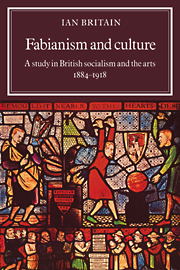Book contents
- Frontmatter
- Contents
- Preface
- List of abbreviations
- Introduction
- PART I THE LITERARY AND ARTISTIC ORIGINS OF FABIAN SOCIALISM
- 1 Thomas Davidson, the New Life Fellowship and the earliest Fabians
- 2 The young Webbs: towards a socialist partnership
- 3 Three Fabian essayists and William Morris
- 4 Bernard Shaw
- PART II ART, AUSTERITY AND PLEASURE IN FABIAN SOCIALISM
- PART III FABIANISM, ÉLITISM AND POPULAR CULTURE
- Conclusion
- Notes
- Bibliography
- Index
2 - The young Webbs: towards a socialist partnership
Published online by Cambridge University Press: 29 September 2009
- Frontmatter
- Contents
- Preface
- List of abbreviations
- Introduction
- PART I THE LITERARY AND ARTISTIC ORIGINS OF FABIAN SOCIALISM
- 1 Thomas Davidson, the New Life Fellowship and the earliest Fabians
- 2 The young Webbs: towards a socialist partnership
- 3 Three Fabian essayists and William Morris
- 4 Bernard Shaw
- PART II ART, AUSTERITY AND PLEASURE IN FABIAN SOCIALISM
- PART III FABIANISM, ÉLITISM AND POPULAR CULTURE
- Conclusion
- Notes
- Bibliography
- Index
Summary
Sidney Webb once rather scornfully caricatured certain Ruskinian ideals held by early Fabians. This might seem to support the popular image of him as one who ‘sought to eliminate or radically play down ethical or aesthetic motives’ in socialism. At the Fabian Society Conference of June 1886, he advocated the use of more, not fewer, machines in England, and then gave an account of the customary objections to this kind of scheme: ‘Mr. Ruskin thinks it unpoetical. And in this very conference we have already had the charming idyll sung of every man living on his own garden, sitting by the shade of his own figtree, sweetly contemptuous of the Philistine millhand. Whether this be a good ideal or not, it is obviously a hopeless dream.’ Webb's defence of machines, however, as with William Clarke's, was based partly on their ‘labour-saving’ capacity and the opportunities they offered — in combination with a greater supply of ‘Personal’ or ‘Consumer's Capital’ — for the population as a whole to have more leisure and to gain greater enjoyment from life, including artistic enjoyment. As well as wanting every house to have hydraulic lifts, the electric light, the telephone and a new ‘hot & cold’ water supply, he wished for all families to have comfortable clothes and furniture, pictures and music and for ‘every man and woman to have the opportunity of being thoroughly taught, not only as now the mere elements of learning, but also one or two skilled handicrafts & the studies which are the pleasures of life’.
- Type
- Chapter
- Information
- Fabianism and CultureA Study in British Socialism and the Arts c1884–1918, pp. 53 - 70Publisher: Cambridge University PressPrint publication year: 1982

